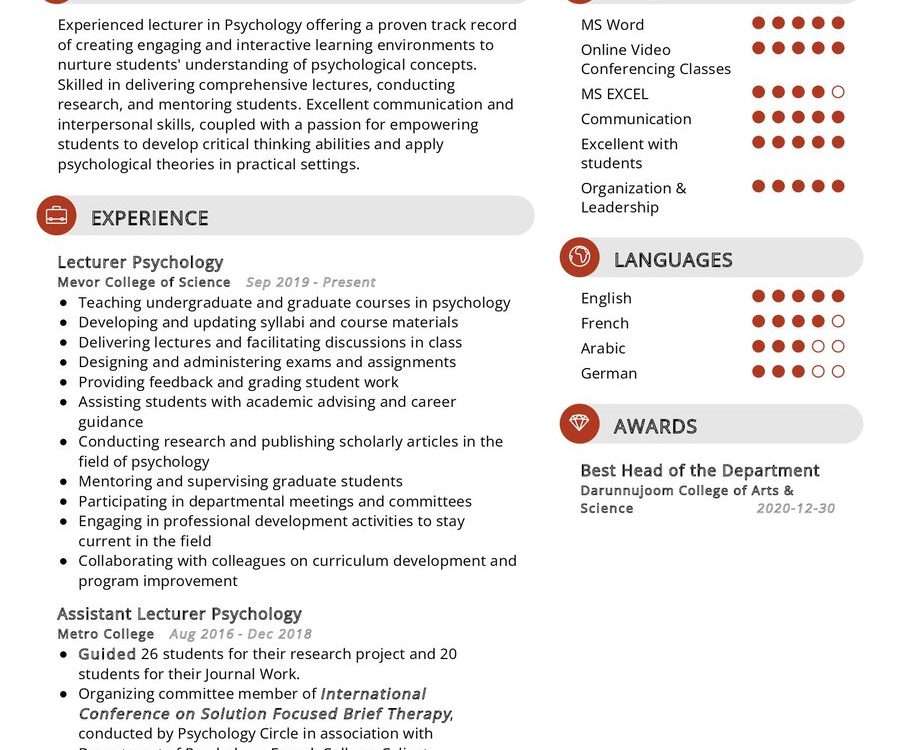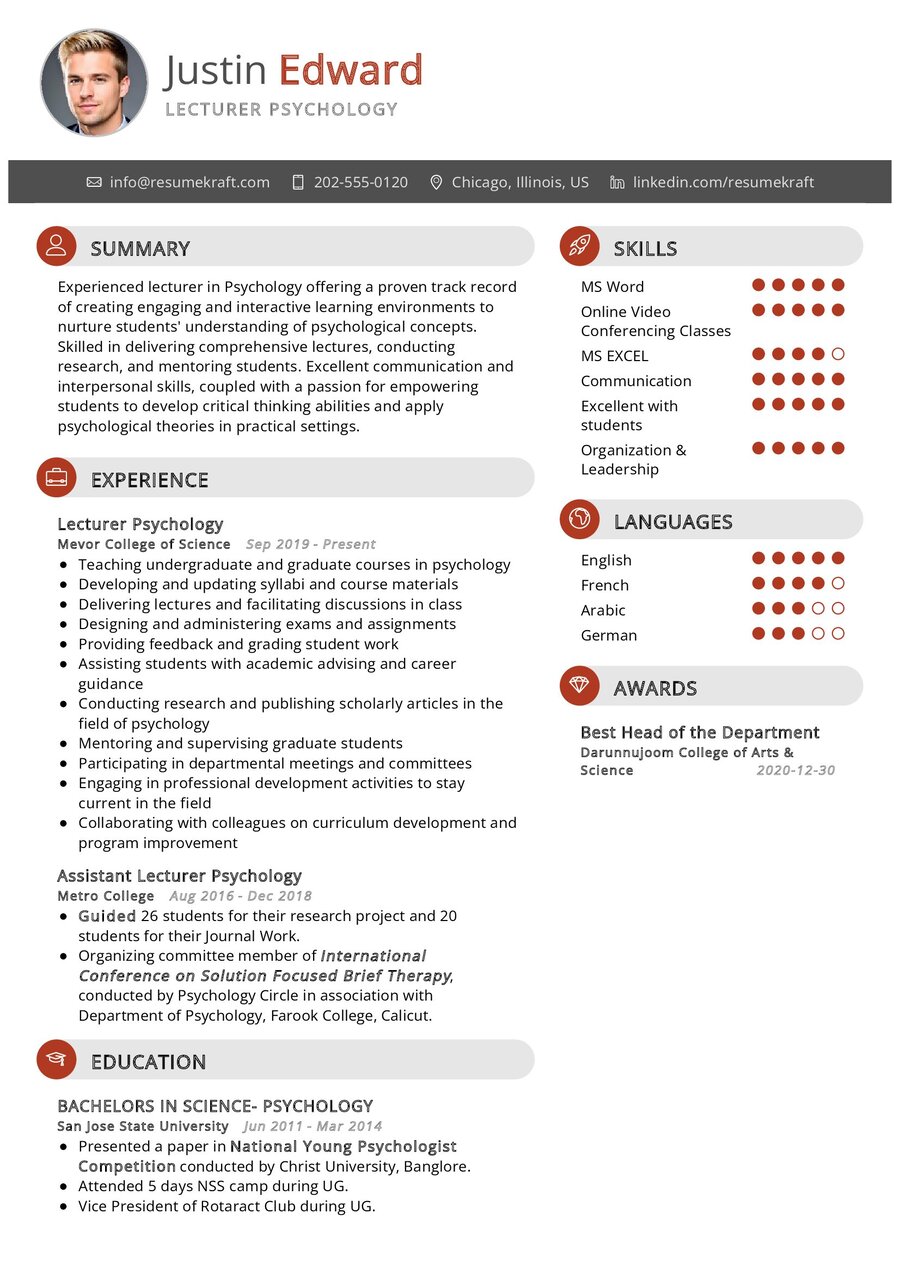Unlocking Success as a Lecturer in Psychology
Embarking on a career as a Lecturer in Psychology is a journey that intertwines academic expertise with a passion for teaching. In the evolving landscape of education, the role of a Psychology Lecturer holds significant importance, shaping the minds of future professionals in the field. Let’s delve into the multifaceted responsibilities, job requirements, and essential skills that define the path to success in this role.
What is the Role of a Psychology Lecturer?
As a Psychology Lecturer, your role extends beyond the confines of traditional teaching. It involves fostering a dynamic learning environment, where students not only absorb theoretical knowledge but also develop critical thinking and analytical skills. The responsibilities of a Psychology Lecturer can be outlined as follows:
- Designing and delivering engaging lectures that cover core concepts in psychology.
- Mentoring and guiding students in their academic pursuits, offering support and insights.
- Conducting research in your area of expertise, contributing to the academic community.
- Creating a positive and inclusive classroom atmosphere that encourages student participation.
- Staying updated on the latest developments in psychology to incorporate relevant insights into your teaching.
- Providing constructive feedback on student work, aiding in their continuous improvement.
Being a Psychology Lecturer is not just about disseminating information but inspiring a new generation of psychologists.
What are the Psychology Lecturer Job Requirements?
To embark on the journey of becoming a Psychology Lecturer, certain qualifications and skills are essential. Let’s explore the prerequisites that will set you on the path to success in this rewarding role:
- A Master’s or Ph.D. in Psychology, showcasing a deep understanding of the subject matter.
- Proven experience in academic research, with published work demonstrating your contributions to the field.
- Strong communication skills, both written and verbal, to effectively convey complex concepts to students.
- Passion for teaching and mentoring, with the ability to inspire and engage students.
- Adaptability to different learning styles and the capacity to create an inclusive learning environment.
- Active involvement in professional organizations and conferences to stay abreast of industry trends.
- Experience with diverse teaching methodologies, including the integration of technology in the classroom.
Continual learning and a commitment to personal and professional growth are key elements in the journey to becoming a successful Psychology Lecturer.
Responsibilities of a Psychology Lecturer
The role of a Psychology Lecturer is multifaceted, encompassing various responsibilities that contribute to the overall educational experience. Let’s explore the core responsibilities that define this role:
- Developing and updating course materials to reflect the latest advancements in psychology.
- Engaging in one-on-one sessions with students to provide academic guidance and support.
- Organizing and participating in academic events, fostering a sense of community within the department.
- Supervising student research projects and theses, guiding them in their academic pursuits.
- Collaborating with colleagues to enhance the curriculum and introduce interdisciplinary perspectives.
- Encouraging critical thinking and independent research skills among students.
Each responsibility adds a layer to the rich tapestry of your role as a Psychology Lecturer, contributing to the academic growth of your students.
Psychology Lecturer CV Writing Tips
Crafting a compelling CV is essential in showcasing your qualifications and experience as a Psychology Lecturer. Here are some tips to help you create a CV that stands out:
- Highlight your educational background, emphasizing your degree and any relevant certifications.
- Detail your research experience, showcasing any published papers, articles, or conference presentations.
- Include a section on teaching experience, specifying the courses you’ve taught and any innovative teaching methods employed.
- Showcase your involvement in professional organizations, conferences, and any leadership roles you’ve undertaken.
- Quantify your achievements where possible, such as the number of students mentored or successful research projects supervised.
Your CV is a snapshot of your academic journey, so make it compelling and reflective of your passion for psychology and teaching.
Psychology Lecturer CV Summary Examples
Your CV summary is the first impression you make on potential employers. Craft a powerful summary that encapsulates your expertise and passion for psychology:
- “Dedicated Psychology Lecturer with a Ph.D. in Psychology and a proven track record of impactful research. Passionate about creating engaging learning environments and fostering critical thinking skills in students.”
- “Experienced Psychology Lecturer with a Master’s degree and a strong background in cognitive psychology. Committed to staying at the forefront of the field and inspiring students to excel.”
- “Innovative Psychology Lecturer with a focus on incorporating technology into the classroom. Published researcher dedicated to guiding students in their academic and professional journeys.”
Your CV summary sets the tone for your application, so make it compelling and reflective of your unique strengths.
Create a Strong Experience Section for Your Psychology Lecturer CV
Your experience section is the heart of your CV, where you detail your contributions and achievements. Here are examples to guide you:
- “Led a research team investigating the effects of cognitive therapy on anxiety disorders, resulting in two published papers in reputable journals.”
- “Revitalized the curriculum for the Introduction to Psychology course, incorporating real-world case studies and interactive learning modules.”
- “Supervised and mentored graduate students in their research projects, with several projects receiving recognition at academic conferences.”
Each experience is a testament to your dedication and impact as a Psychology Lecturer, so showcase them prominently in your CV.
Sample Education Section for Your Psychology Lecturer CV
Your educational journey is a critical aspect of your CV. Showcase your academic achievements with pride:
- Ph.D. in Psychology, XYZ University, a journey of in-depth research and contributions to the field, 20XX.
- Master of Science in Cognitive Psychology, ABC University, the foundation of your expertise in the field, 20XX.
- Teaching Certification in Higher Education, Certification Institute, a recognition of your commitment to effective teaching strategies, 20XX.
Each educational qualification is a stepping stone in your journey as a Psychology Lecturer, so highlight them to underscore your expertise.
Psychology Lecturer Skills for Your CV
Your skill set as a Psychology Lecturer is diverse, encompassing both soft and hard skills. Let’s list down the essential skills that will set you apart:
Soft Skills:
- Effective communication and presentation skills, crucial for conveying complex psychological concepts.
- Mentoring and counseling abilities, supporting students in their academic and personal growth.
- Adaptability to different learning styles, ensuring inclusivity in the classroom.
- Passion for teaching and the ability to inspire a love for psychology in students.
- Interpersonal skills, fostering positive relationships with students, colleagues, and the academic community.
Hard Skills:
- Research proficiency, with a track record of published work in reputable journals.
- Technological competence, incorporating digital tools and platforms into the teaching environment.
- Curriculum development, designing engaging and relevant course materials.
- Project supervision, guiding students in their research endeavors.
- Evaluation and assessment skills, ensuring fair and constructive feedback on student work.
Each skill is a tool in your arsenal, contributing to your success as a Psychology Lecturer.
Common Mistakes to Avoid When Writing a Psychology Lecturer CV
As you craft your CV, be mindful of common pitfalls that can hinder your chances of securing your desired position. Avoid these mistakes:
- Avoid using a generic CV; tailor it to the specific requirements of the institution you are applying to.
- Don’t solely list your academic achievements; highlight your teaching and research contributions.
- Include a cover letter to complement your CV, providing additional insights into your teaching philosophy and research interests.
- Avoid jargon that may be unclear to non-specialists; aim for clarity and simplicity in your language.
- Proofread your CV thoroughly to eliminate any grammatical errors or typos that could detract from your professionalism.
Avoiding these common mistakes ensures that your Psychology Lecturer CV is a true reflection of your qualifications and expertise.
Key Takeaways for Your Psychology Lecturer CV
As you conclude your CV, keep these key points in mind to make a lasting impression:
- Emphasize your commitment to both research and teaching, showcasing the balance between academic excellence and student engagement.
- Highlight your involvement in the academic community, including conferences, workshops, and collaborations with colleagues.
- Showcase your ability to adapt to different learning styles and your passion for creating an inclusive and dynamic learning environment.
- Include a section on continuous learning, demonstrating your commitment to staying at the forefront of the field.
Remember, your CV is not just a document; it is a canvas where you paint your academic story, a story of growth, learning, and impact. Best of luck!
Finally, feel free to utilize resources like AI CV Builder, CV Design, CV Samples, CV Examples, CV Skills, CV Help, CV Synonyms, and Job Responsibilities to create a standout application and prepare for the [Psychology Lecturer] job interview.


